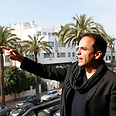
Morocco's Jewish community explored
Although Jewish population has now dropped to around 3,000, its history and culture continues to make its mark on northwestern African country today, with Arab and Berber Moroccans having incorporated many Jewish habits into their daily lives
Although the Jewish population has now dropped to around 3,000, the history and culture of this community continues to make its mark on the country today, with Arab and Berber Moroccans having incorporated many Jewish habits into their daily lives.
Video courtesy of jn1.tv
Today the Jewish community is mostly found in Casablanca, the thriving economic hub of the country, and with a keen eye one can easily spot the clues left today in Moroccan culture that have roots in Jewish history, including musical and architectural traditions.
Jewish Moroccans today remain culturally active, with two films called "Goodbye Mothers" and "Where Are You Going Moshe?" detailing the massive departure of Jews from Morocco that occurred in the early 60s.
Documentary maker Kamal Hachkar produced the film "Tinghir-Jerusalem: Echoes from the Mellah," which won the Driss Benzekri award at Morocco’s International Human Rights Festival and details the plurality of identities and relationships of Moroccans from Arab, Jewish and Berber heritage.
What was your prime ambition when producing the film?
"My first ambition was to talk about the history of a world that was erased, at least in the new generations' minds. And to me it was also an opportunity to launch a cry against this historical amnesia," says Hachkar.
"It actually interrogates the Muslim memory of the coexistence with their Jewish neighbors and trying to gather these missing Jews who had emigrated to Israel in the 1960s."
You call yourself a "Mediterranean child." Which features of yourself do you refer to?
"Being both Moroccan and French, Berber and Muslim, I have noticed that the Mediterranean territory gathers all cultures giving it a unique identity. Eventually, it is the best way for me to define my multicultural identity."
You mentioned an identity "maze." Do you fear that young people tend to get lost in their pluralized identities?
"One's identity is constructed in perpetual motion, this film is a hymn to plural identities. Nowadays one either gets trapped in isolationism or self-hatred. That's why it is important to claim its various identities in order to feel comfortable both on personal and social view.
"And indeed, unfortunately today there are political and religious people who want to exploit this issue here, this self-loathing in the globalization context."
Some 200 people protested against the screening of your film at the National Film Festival of Tangier, accusing the film of pro-Israeli sentiment. What kind of reactions have you received from viewers generally?
"The new Moroccan Constitution itself recognizes precisely the plurality of identities. It enhances the Jewish heritage involved as part of the Moroccan identity, of the Berber identity, as well as the Andalusian identity. And so most reactions to my film were very positive. I had a pretty good press. But obviously you cannot please everyone."
So these internationally positive reactions reflect a growing need to rebuild this shared past?
"Yes. Now we must move from words to action, that is to say, after the Jewish heritage in Morocco was recognized in Morocco, the History must be fully taught in schools. We must stop the exploit, we need to stop building a generation of amnesiacs in Morocco.
"Furthermore, an amnesia that not only concerns our very own plurality with the Jewish history but all the Moroccan communities I have mentioned earlier."
With such a rich history to their name, what was it that instigated the mass immigration of Jews out of Morocco?
In the midst of the Arab-Israeli conflicts of 1948, riots broke out in the country which left around 50 Jews dead and with the recently-formed Israel, many Moroccan Jews saw this as an opportunity to escape persecution. The king outlawed Jewish immigration in an attempt to stop both the weakening of Morocco and the strengthening of Israel but thousands still managed to leave.
Despite moving away in such numbers, many Jews of Moroccan descent continue to feel a connection with the country, making pilgrimages, researching their history and maintaining websites.
Moroccan history has both suffered and prospered because of its position at a junction between different people's cultures and countries. And despite a history of persecution over the last 2,000 years, the current open door policy for Jews to return to Morocco is something that can only help strengthen the relationships embedded in the country.
A new generation with new identities could help bring these two communities together, while learning about their shared history and looking forward into a shared future.










